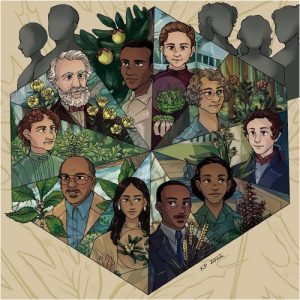I just returned from an energizing meeting of Plant Biology Educators (#PlantSciEd) and want to share some resources that I learned about to promote a more inclusive curriculum, classroom, and community.
Fourteen recommendations to create a more inclusive environment for LGBTQ+ individuals in academic biology, by Cooper et al. (2020) CBE—Life Sciences Education 19:es6, 1–18 https://doi.org/10.1187/cbe.20-04-0062.
Re-imagining reproduction: The Queer possibilities of plants, by Subramaniam and Bartlett (2023) Integrative and Comparative Biology 63: 946–959, https://doi.org/10.1093/icb/icad012.
Building an inclusive botany: The “radicle” dream, by Mabry et al., (2024) Plants, people, planet 6: 544-557. https://doi.org/10.1002/ppp3.10478 .
Oceanography’s diversity deficit: Identifying and addressing challenges for marginalized groups, by Abdel-Raheem, Payne, Rivera et al. (2023) Oceanography 36(4):44–50, https://doi.org/10.5670/oceanog.2024.136.
Confronting the legacy of eugenics and ableism: Towards anti-ableist bioscience education, by Da Silva and Hubbard (2024) CBE-Life Sciences Education https://www.lifescied.org/doi/10.1187/cbe.23-10-0195
Running inclusive university field courses for disabled students, by Chloe Stevens. Available at https://www.bristol.ac.uk/media-library/sites/biology/documents/RUNNIN~1.PDF
Why we need to decolonize the biosciences curriculum, by Joshi et al. (2024) The Biochemist 46: 26 – 32. https://doi.org/10.1042/bio_2024_102
Decolonizing and diversifying the biosciences curriculum – a practical guide to getting started, by Mansfield et al. (2024) The Biochemist 46: 33 – 38. https://doi.org/10.1042/bio_2024_103

0 Comments